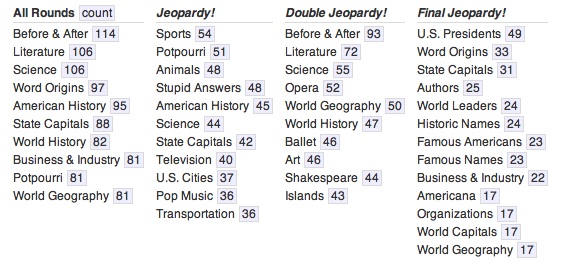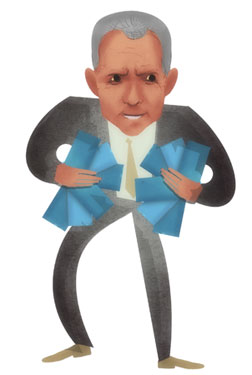I'll Take Jeopardy! Trivia for $200, Alex
The most common categories and hardest clues in the game show's long history. Plus: Where to find the Daily Doubles.
In a follow-up article, Jeremy Singer-Vine explains why the only silversmith you need to know is Paul Revere and shows you where to find the Daily Doubles.
Ken Jennings says quiz bowl helped him prepare for his record Jeopardy run. Other fans and contestants turn to the Internet. Daniel D'Addario explores J-Archive.com, the unofficial Jeopardy! Web site where loyal fans have transcribed thousands of the game show's episodes. The database is big: It covers practically every episode from the last decade and many of the shows that aired in the decade-plus before that. It's also full of detail: The transcripts include clues, the contestants' answers (right and wrong), and even Alex Trebek's patter. But there's not much big-picture analysis. What, for instance, is the most common Jeopardy! category? Which game-board position is most likely to hold a Daily Double?
To answer these questions, I downloaded the Web page for each of the approximately 3,400 episodes transcribed on J-Archive. Then I wrote a series of computer scripts to pull relevant data from the pages and make sense of it. (The data-exploration and cleaning tool, Google Refine, was a huge help.) In the analyses that follow, please bear in mind this disclaimer: Despite its dazzling achievements, J-Archive is still an incomplete database, and, despite my best efforts to minimize errors, reprocessing and parsing the archive data has probably introduced at a few of them.
The simplest question to answer is, "What's the most common Jeopardy! category?" Jeopardy! fans can likely reel off a slew of contenders, both ones that are standard on trivia shows ("Science" and "U.S. History," for example) and specific to Jeopardy! ("Potent Potables" and "Potpourri"). But which category leads the pack? Overall, it's "Before & After," a tricky category that has appeared 114 times in the episodes logged at J-Archive. That category, which asks contestants to come up with answers like "Who is Ford Madox Ford Mustang?" ("Parade's End author who drives the first of the Pony Cars") and "What is The Joy of Sex Pistols?" ("Alex Comfort's romantic how-to guide for Johnny Rotten & Sid Vicious' band"), accounts for about 0.26 percent of all category appearances, or one out of every 387 categories. (This calculation doesn't include riffs on the theme, like "Superhero Before & After" and "Supreme Court Before & After.") Here are the top 10 most popular categories overall, and in each round of the game:

There's some repetition in the round-specific lists; as you can see, "Science" is common in both the first and second rounds, while the top-10 lists for Double and Final Jeopardy share "State Capitals." To get at the distinctive characteristics of each round, though, we'd want a list of categories that appear most frequently in the round compared to how often they appear in the entire dataset.
Using this method of analysis, a portrait of the first round starts to emerge—and it looks like grade school. The top-10 categories, in order, are: "Stupid Answers," "Nature," "Hodgepodge," "4-Letter Words," "Common Bonds," "Pop Music," "Potent Potables," "Sports," "Food & Drink," "Fruits & Vegetables."
Double Jeopardy!, meanwhile, is more like college, with a touch of the yacht club: "Chemistry," "Physics," "Classical Music," "Before & After," "Art," "Opera," "Art & Artists," "Ballet," "Theatre," "Architecture."
Final Jeopardy! screams patriotism, with a dash of diplomacy and a dearth of science: "U.S. Presidents," "World Leaders," "Famous Names," "Famous Americans," "Historic Names," "Authors," "State Capitals," "Word Origins," "Business & Industry."
Knowing what categories show up most frequently might be helpful in preparing for an appearance on the show. But let's get down to the clue level: What's the most common answer on Jeopardy? That would be "What is Australia?" That response appears in J-Archive 208 times, out of 197,736 total answers—to clues as diverse as "In terms of rainfall, it's the driest continent after Antarctica" and "The overarm 'crawl' swimming stroke was introduced to England in 1902 from this country." (For technical reasons, I'm only counting the first two rounds of Jeopardy in this analysis. Also note that while Google Refine helped group answers like "Burma (Myanmar)" and "Myanmar (or Burma)," idiosyncrasies among transcribers means that the answer-counts are inevitably imprecise.) In fact, thanks to the prominence of geography-related categories, the Top 23 answers are all places. (Click
Of course, unless you plan on blurting out "What is Australia?" every time you hit the buzzer, it's more useful to know the top answers for the top categories. Eight of the 536 "Before & After" answers have cropped up twice, including "What is Beauty and the Beast of Burden?" "Who is Peppermint Patty Hearst?" and "Who is Babe Ruth Ginsburg?" (In 1998, the clue to this last one was "The Sultan of Swat makes it to the Supreme Court." In 2004: "Portly Yankee slugger who became a more svelte Supreme Court Justice.") In "Science," your best bet is "What is gravity?" (eight of 486 answers), followed by "What is hydrogen?" (seven) and "What are chromosomes?" (four). In "Literature," it's "What/who is Don Quixote?" (eight of 463). For "Sports," "What is golf?" (six of 344) is the most likely answer. If you're stumped on a "Bodies of Water" clue, it's most likely "What is Lake Victoria?" (seven of 316).
While we're discussing strategy, where's the best place on the board to find a Daily Double? Far from being randomly distributed, Daily Doubles are heavily concentrated at the bottom of the board. Of the roughly 10,000 such clues logged on J-Archive, 92 percent were in the bottom three (of five) rows. In fact, only two Daily Doubles in the archive ever appeared in the top-left corner, once in 1999 and then in 2003. The cell densest with Daily Doubles? Fourth from the top, far left—home to 834 of them, or 8 percent of the total.
How well do Jeopardy! contestants perform as a group? Overall, not counting Final Jeopardy!, 85 percent of questions are answered correctly by at least one contestant, and 79 percent on the first shot. Not surprisingly, contestants do better in the first round than the second, with 88 percent versus 82 percent of clues solved. As players descend the gameboard's rows, the clues get harder: 96 percent of clues in the top row are solved, 91 percent in the second row, 86 percent in the third row, 80 percent in the fourth row, and just 71 percent in the bottom row.
The hardest category for contestants is "Classical Music," at least among categories that have appeared a minimum of 50 times. Just 72 percent of its clues are solved. "Art and Artists" at 76 percent, and "Word Origins," at 79 percent are the next-hardest. The easiest? Contestants solve both "Sports" and "Stupid Answers" 91 percent of the time, followed by "Food" and "The Movies" at 90 percent.
Among the most interesting subsets of clues are those that all three contestants answer incorrectly. It happens rarely—just 309 times in the J-Archive, by my count, or less than once every 600 clues. Of the nearly 200,000 clue-answer combinations I was able to identify in J-Archive, there were only 17 triple-wrongs in the first row of the first round, home to the game's easiest clues (worth just $100 or $200, depending on the era the game was played in). A selection of 10 of these are presented in an interactive quiz below. I'll post the other seven in this article's comments section throughout the day.
| Click anywhere in the box to reveal the answer. | |||||||||||||||||||||
|
| ||||||||||||||||||||
Slate V: Before Watson Was on Jeopardy!

